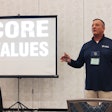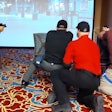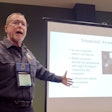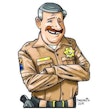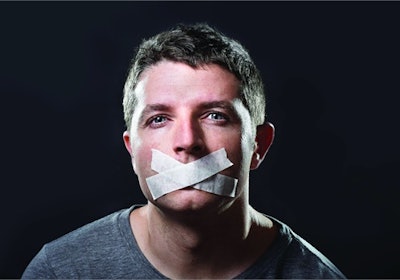
In the United States, the First Amendment is probably one of the most important fundamental rights we have and yet it is also the one that gets seriously abused. The First Amendment states:
"Congress shall make no law respecting an establishment of religion, or prohibiting the free exercise thereof; or abridging the freedom of speech, or of the press; or the right of the people peaceably to assemble, and to petition the government for a redress of grievances."
You would think that something written so succinctly would be easy to understand and follow. And yet, the media is filled with stories proving otherwise. The problem is not with the wording of the First Amendment; the problem is with the interpretation. It turns out that we are our own worst enemy. Private speech is not so private for public (government) workers. Let's look at the First Amendment in general and then how it applies to public employees.
The First Amendment in General
In the beginning, the First Amendment only applied to laws passed by Congress. That changed in 1925 with Gitlow v. New York, 268 U.S. 652, where the protections were expanded to all levels of government—federal, state, and local. However, not all speech is protected, nor is it without consequences. Everyone knows you can't yell "Fire!" in a crowded movie theatre just for fun. There is another element to this. If you do exercise your right to free speech, there's no constitutional requirement that other people including employers, organizations, or schools, continue their association with you once you do.
Look at the "taking a knee" phenomenon in the NFL. Players and coaches are choosing to protest what they consider social injustice by taking a knee during the national anthem or staying in the locker room until the anthem is over. They have a right to do so, as political protest is one of the most protected forms of free speech under the First Amendment.
The flip side to that is that fans have a choice to agree or disagree with their actions. They also have a right to their own forms of protest. Many are showing where they stand by getting rid of team memorabilia, by not going to games, and by not watching professional football on television.
What's Not Protected
Clearly, the First Amendment does not protect all kinds of speech. Although different scholars view unprotected speech in different ways, there are basically nine categories according to the Newseum Institute's First Amendment Center:
• Obscenity
• Fighting words
• Defamation (including libel and slander)
• Child pornography
• Perjury
• Blackmail
• Incitement to imminent lawless action
• True threats
• Solicitations to commit crimes
Plagiarism of copyrighted material is also not protected.
At face value, the list makes sense. What doesn't make sense are some of the courts' decisions on what free speech is and isn't. For example, burning the American flag as a form of free speech is one that I, as a citizen, still question. However, as a law enforcement officer, I would have to let it happen unless any other laws were being violated in association with the act.
Private Versus Public Employees
Something we sometimes forget is there is a difference between how the Constitution treats private versus pubic employers and employees. The First Amendment does not limit private employers. The First Amendment only limits governments at any level.
This means that private employers can restrict their employees' speech in the workplace without violating the First Amendment. If there is a question about free speech, private employees have to seek out other legal remedies like violations of their labor contract or through the application of other labor laws.
On the other hand, public employers can also set rules for their employees. However, they are subject to the limitations of the First Amendment. It can be a slippery slope for agencies because their policies may be too broad and often don't specify how violations would undermine their efficiency.
It's not a free lunch for officers either. For example, were you off duty when you thought you were exercising your rights? Were you on lunch break and, if so, how does your agency view that break: on duty or off? How does what you said or posted on social media affect how you perform your duties?
Speaking of social media, though we often do it to ourselves, it has become the bane of every law enforcement officer. Your agency has the right to discipline you as a way to maintain agency-wide discipline. Any form of speech, including social media rants, that can show a disruption in agency efficiency can lead to discipline.
Times Have Changed
According to an article in the ABA Journal by David L. Hudson Jr., from the late 1800s to around 1960, "the prevailing wisdom was that public employees willingly relinquished their free speech rights when they accepted public employment on or off duty."
In the 1960s (Pickering v. Board of Education), the Supreme Court held that you don't give up your rights of free speech but there must be balance between the free speech of an employee as a citizen and the needs of government as an employer to perform its mission.
This standard was later refined in the late 1980s with Connick v. Myers. Hudson stated, "If the speech touches on matters of public concern, then the court balances the employee's right to free speech against the employer's interests in an efficient, disruption-free workplace." More specifically, a public employee must show their speech involves a matter of public concern and demonstrate how their free-speech interests outweigh their agency's efficiency interests.
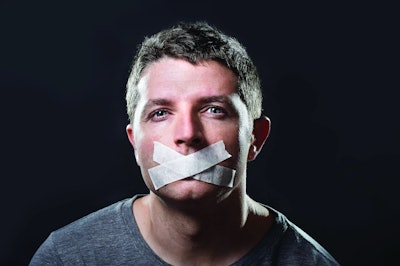 Photo: Getty Images
Photo: Getty Images
In 2006, the Supreme Court ruled in Garcetti v. Ceballos that when public employees make statements pursuant to their official job duties, they have no free speech protection at all. In 2014, Lane v. Franks, Justice Sonia Sotomayor wrote, "Truthful testimony under oath by a public employee outside the scope of his ordinary job duties is speech as a citizen for First Amendment purposes."
Bottom Line for Public Employees
It's true that police departments, public schools, and local governments can't restrict any employee's free speech. But, they can make sure that the type of speech doesn't keep the employee from doing their job or affect the agency's ability to do its job.
Take for example an officer who takes a negative view of the Black Lives Matter Movement. He posts what can be considered a derogatory comment on his Facebook page. He is called out by members of the public who complain to his agency about the post and he is labeled a racist. The agency handles the complaint and after due process, ends up firing him.
Was the officer just voicing his opinion as a citizen or was he causing harm to his ability to perform his duties in the field? That is the one question you must keep in mind before you open your mouth or post something on social media. Will my comments be perceived (perception is reality) as undermining my ability to do my job or negatively affect my agency's ability to do theirs? If you don't keep this in mind, you will have plenty of time to think about it after you turn in all your gear and start looking for a new job.
Amaury Murgado retired a senior lieutenant from the Osceola County (FL) Sheriff's Office with over 29 years of experience. He also retired from the Army Reserve as a master sergeant. He holds a Master of Political Science degree from the University of Central Florida.











